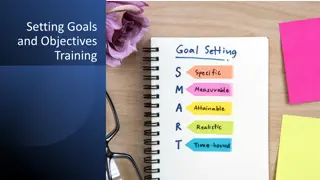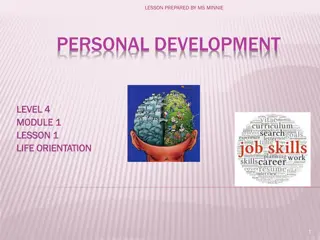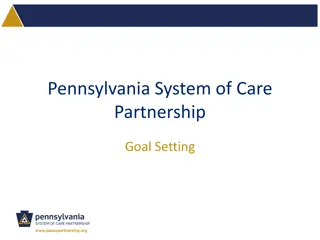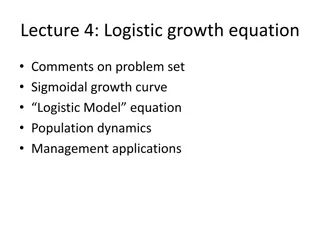The Importance of Setting Goals for Personal Growth and Success
Setting goals is vital for achieving success and personal growth. Goals provide clarity, motivation, focus, and accountability, helping individuals unleash their full potential and live a purposeful life. Learn about different types of goals, the SMART criteria for goal setting, and why setting specific goals is crucial for progress.
Download Presentation

Please find below an Image/Link to download the presentation.
The content on the website is provided AS IS for your information and personal use only. It may not be sold, licensed, or shared on other websites without obtaining consent from the author. Download presentation by click this link. If you encounter any issues during the download, it is possible that the publisher has removed the file from their server.
E N D
Presentation Transcript
GOAL SETTING June 25th, 2014
Why set goals? 1. Gives you an end vision (provides clarity) How can you get the results you want in life if there is no clarity on what actually want? It ensures that you are channeling your time, energy and efforts into things that really matter to you. More conscience decisions are made 2. It motivates you! Your goals represent your inner-desires; the desires that motivate you throughout life By concentrating and visualizing your goals, you become more motivated to achieve real outcomes
Why set goals? Helps you focus It tells you exactly what things you need to focus your time and energy less time spent on less relevant activities Holds you accountable Are you living up to the standards you set for yourself? Accountability to yourself, not someone else!! Allows you to be the best version of yourself Achieve higher potential Stretch beyond your normal self and reach new heights Uncover potential you did not know existed Live your best life Your day-to-day life has more purpose Since you make good or better use of time, you are maximizing your output and experiences when your alive
Types of Goals Short term No more than one month Daily, weekly Long term End point in more than one month away Can be years, months, decades Action Goals short term goals that are used to get the action going toward your primary purpose daily goals or the things you need to get done quickly so you can move on to the next goal Stepping Stone Goals help keep you on track toward your primary purpose These are major markers that identify a progress point toward your ultimate goal in life. Several stepping stone goals lead toward your ultimate goal.
Setting Goals S.M.A.R.T. Each letter in SMART refers to a different criterion for judging objectives.
Goal Setting - Specific Stresses the need for a specific goal, rather than something too general A specific goal will usually answer the five 'W' questions: What: What do I want to accomplish? Why: Specific reasons, purpose or benefits of accomplishing the goal. Who: Who is involved? Where: Identify a location. Which: Identify requirements and constraints.
Goal Setting Measurable Helps reach targets or measure progress A measurable goal will usually answer questions such as: How much? How many? How will I know when it is accomplished? Indicators should be quantifiable
Goal Setting Achievable Allows you to see if the goals are realistic and attainable An Achievable goal will usually answer the question: How: How can the goal be accomplished?
Goal Setting Relevant Do your goals actually matter? A relevant goal can answer yes to these questions: Does this seem worthwhile? Is this the right time? Does this match our other efforts/needs? Are you the right person? Is it applicable in the current socio- economic- technical environment?
Goal Setting Time Bound Give your goals a target date. A time-bound goal will usually answer the question: When? What can I do six months from now? What can I do six weeks from now? What can I do today?
Achieving Goals Establish Use the SMART technique to establish your goals who, what, where, why How many, how long when should it be completed Is it important Is it specific enough Etc.
Achieving Goals- Strategyslide 1 What s your game plan for achieving you goals? Take the time to think about ways you can best achieve you goal Quit smoking example E-cigarette for a few months then wean off Little to no alcohol drinking - e-cig for backup Deep breath and clear thoughts technique Understood that my friends smoked needed to be comfortable being around it Having one is NOT ok
Achieving Goals Strategy slide2 Tips for creating a strategy Keep yourself accountable! Leverage your resources Reward yourself for milestones Identify what works and what doesn t work Understand your environment
Achieving Goals Planning- slide 1 The Framework or Schedule for achieving your goal Write down the specifics Which objectives should I accomplish first? In what order Can use a goal sheet!! Makes tasks within each goal be specific as possible Create timetables for achieving them
Achieving Goals Planning slide 3 Tips Identify key objectives, then identify smaller tasks within Allocate sufficient time for each task Schedule buffer time Do not deviate from your blueprint Bundle smaller tasks if possible Weight loss- Get healthy foods at the store, and go to gym on way home
Achieving Goals Executionslide 1 This step is when meeting your goals becomes physical reality This is the step that people actually see! Should use the establishing, strategy, and planning steps and apply them to your life
Achieving Goals Execution slide 2 Tips Understand that emotions or will power will fluctuate
Additional Information-2 Nondiscrimination and Equal Opportunity Statement Metropolitan Community College does not discriminate on the basis of race, color, national origin, religion, sex, marital status, age, disability or sexual orientation in admission or access to its programs and activities or in its treatment or hiring of employees. This work is licensed under the Creative Commons Attribution 4.0 International License. To view a copy of this license, visit http://creativecommons.org/licenses/by/4.0/ This product was funded by a grant awarded by the U.S. Department of Labor s Employment and Training Administration. The product was created by the grantee and does not necessarily reflect the official position of the U.S. Department of Labor. The Department of Labor makes no guarantees, warranties, or assurances of any kind, express or implied, with respect to such information, including any information on linked sites and including, but not limited to, accuracy of the information or its completeness, timeliness, usefulness, adequacy, continued availability, or ownership. The Nebraska Consortium of community colleges is comprised of equal opportunity/affirmative action institutions.























